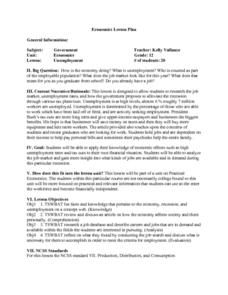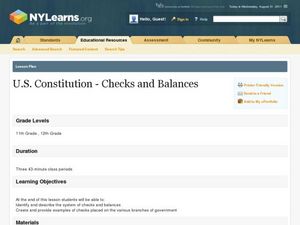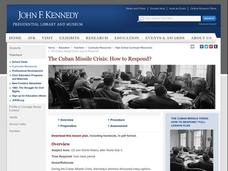Curated OER
State of Affairs
Students examine the various roles and duties of state government officials and offices to create an Informative Guide to Our State's Government. They explore the changing relationship between governor and lieutenant governor in New York.
Curated OER
Unemployment
Twelfth graders evaluate the state of the economy and develop a definition for unemployment. In groups, they read an article about how the economy affects society and discuss how it affects them. Individually, they research the types...
Stanford University
Great Society
Students explore the Great Society. In this U.S. history and government instructional activity, students view the video "The Great Society," identify the major points of the speech, and compare and contrast the content with The New Deal.
Curated OER
What a Relief!
How are disasters addressed by the Federal Government? This New York Times lesson, based on the article "Disaster Aid: The Mix of Mercy and Politics," prompts middle schoolers to discuss the idea of using a disaster declaration as a...
Deliberating in a Democracy
Cloning
Students explore the issues and challenges of cloning. In this cloning lesson plan, students read about how cloning affects people and the types of cloning, then they prepare a debate either for or against cloning.
Curated OER
Perks and Perils
Learners research the life of the first family. In this U.S. Government lesson plan, students take a White House quiz, read an article about the first family and write in their journals about a typical day in their lives versus what a...
Curated OER
U S Constitution--Checks and Balances
Students get an in-depth look at how our checks and balances system helps maintain the separating of powers between the three branches of government. They use current event head lines and insert them into he appropriate space on the...
Curated OER
Rights of the Accused in Search and Seizure
High schoolers explain the rationale behind the Fourth Amendment, and the types of activity regulated by the Constitution. They analyze situations, and explain a citizen's rights when an unlawful search or seizure is conducted.
Curated OER
Lessons in Legal Ethics: Crime and the Media
High schoolers examine a variety of ethical issues that arise in criminal cases. They get into groups, and perform a case study of a real situation in which many of these ethical issues came up. All of the worksheets needed to...
Curated OER
Indiana Courts: How Do They Work?
Young scholars identify the branches of Indiana's judicial system and determine the differences between the different courts and different types of cases. Students create a flow chart showing how a court case works its way through the...
Curated OER
The Constitution: The Head of State
Learners explore politics by participating in a round-table discussion with classmates. In this monarchy lesson, students identify the different political leaders in Australia and conduct a class discussion about the country. Learners...
C-SPAN
Primary and Secondary Sources: Trailblazers in Congress
Trailblazers forge the path into uncharted territory, they establish a precedent for others to follow. Young historians research trailblazers in Congress using primary and secondary sources to profile outliers that changed the face of...
Curated OER
U.S. Constitution - Checks and Balances
Learners examine the separation of powers of the branches of the U.S. federal government. In this U.S. Constitution instructional activity, students listen to a SMART Board supported lecture on checks and balances of the Judicial,...
Curated OER
Family Law - Child Abuse
Students identify and examine children's protective rights provided by law, discuss difficulties of determining whether child is abused or neglected, identify types of child abuse and neglect, analyze hypothetical situations to determine...
Curated OER
Social Security
Students examine the official website for the Social Security Administration. They learn the history of the program and what it is supposed to do for Americans. They compare social security with other types of retirement accounts.
Curated OER
FROM STUDENT TO GLOBAL CITIZEN
Learners develop an awareness of citizenship and how it's defined globally. They explore the cultural diversity of different types of communities around the world. In addition, they assess the rights and responsibilities that are...
Curated OER
The Mayflower Compact
Eighth graders investigate historical documents of the United States by reading the Mayflower Compact. In this U.S. History lesson, 8th graders analyze the wording of the original Mayflower Compact of the first U.S. settlers and...
Foreign Policy Research Institute
Life in a Totalitarian State
This interesting role-playing activity helps your class understand some of the qualities of totalitarianism by assigning each one as a spy or comrade citizen for a duration of five days. Students should find this highly engaging and...
Carolina K-12
Preventing Voter Fraud or Encouraging Voter Suppression?
The issues of voter fraud and voter suppression are relevant in every election, local as well as national. Soon-to-be voters learn about a recent bill proposed in North Carolina, the Voter Information and Verification Act, and decide for...
National Endowment for the Humanities
Revolution '67, Lesson 2: What Happened in July 1967? How Do We Know?
Even in a world in which dozens of participants and curious onlookers record every controversial event, the basic facts of what happened are often in dispute. Revolution '67, Lesson 2 explores 1967 Newark, New Jersey using an examination...
Curated OER
An Introduction To Law
Students identify 4 branches of law-criminal, civil, consumer, and family. using a newspaper, they locate examples of how laws affect citizens on a daily basis.
Foreign Policy Research Institute
Defining Democracy and Freedom
This is a simple but effective introduction to democracy. It requires the class to generate working definitions of key terms (provided) and to determine the degree of democracy in various geographic locations today. After they conduct...
John F. Kennedy Presidential Library & Museum
The Cuban Missile Crisis: How to Respond?
For 13 days, the United States stood on the edge of nuclear War. The Soviet Arms buildup in Cuba is the focus of an activity that asks groups to analyze how the governmental role each of John F. Kennedy's advisors played went on to...
Carolina K-12
How Do I Pre-Register and Vote in North Carolina?
This practical activity helps young citizens learn about pre-registration to vote in elections, discuss the merits and flaws of the pre-registration process, and register themselves. The concluding activity has young voters creating an...
Other popular searches
- Compare Types of Governments
- 3 Types of Government
- Three Types of Government
- Five Types of Government
- Types of Government Diagram
- World Types of Government
- Government Types
- Government Types Lesson Plans
- World Government Types
- Types of Government Systems
- Different Types of Governments
- Greece Types of Governments

























